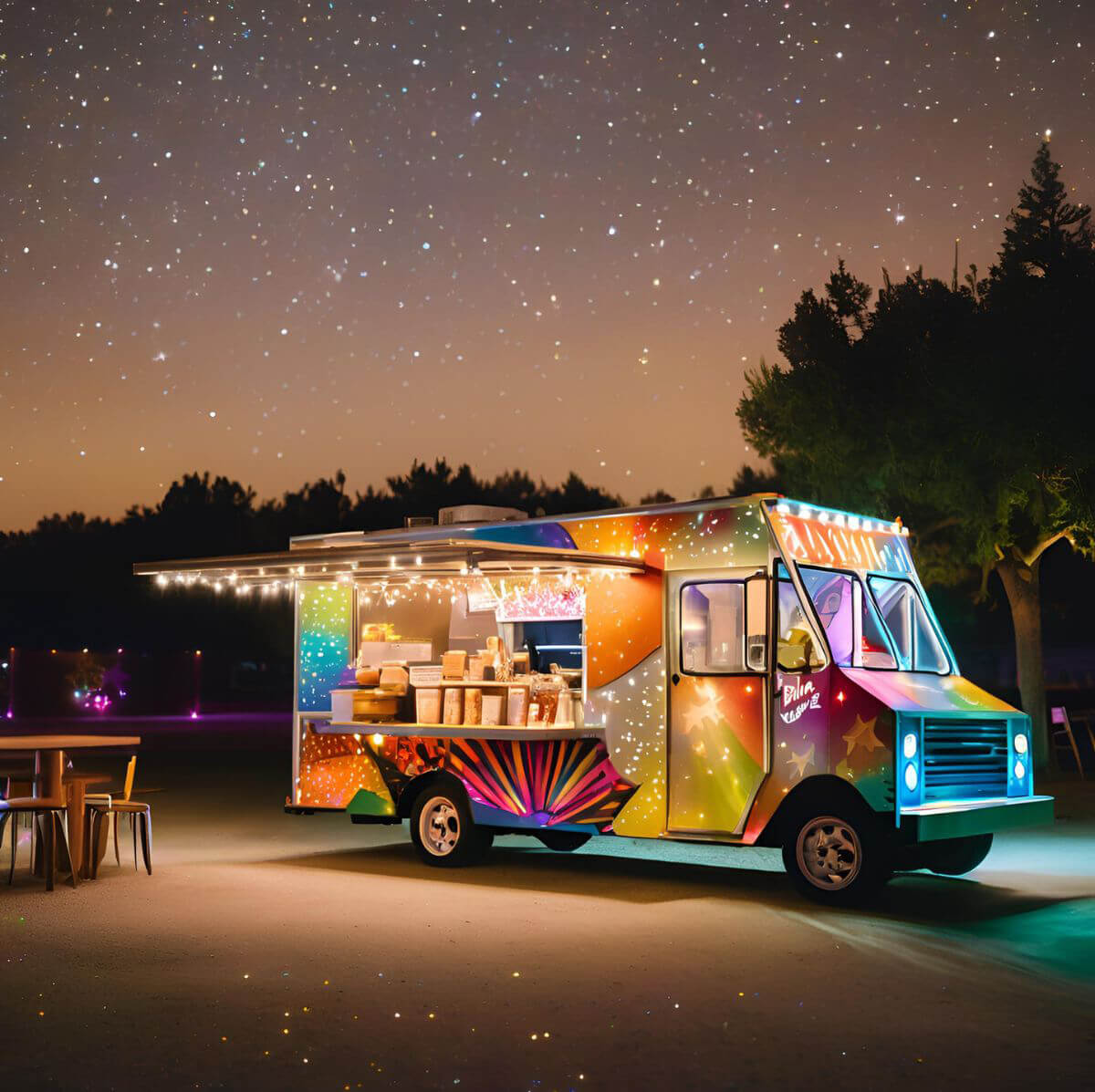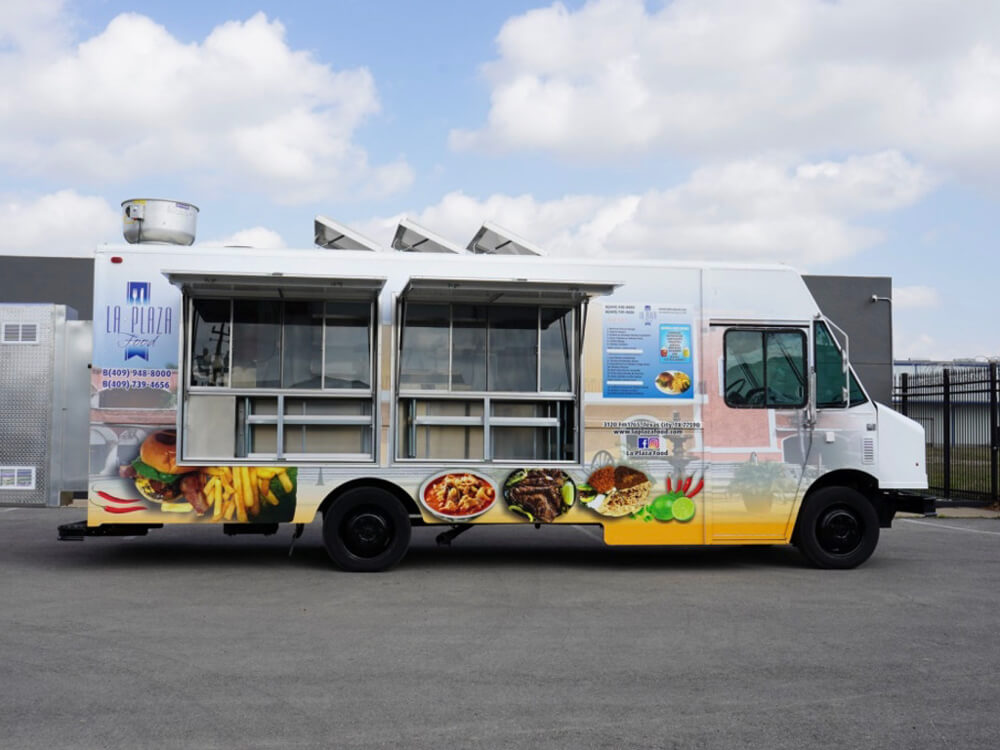
The food truck industry continues to thrive, with tens of thousands of food trucks operating across the U.S., catering to the demand for diverse, convenient dining options.
As a mobile business, finding the right overnight parking for your food truck is essential for security, maintenance, and readiness for the next day’s service. Unlike standard vehicles, food trucks need secure, designated spaces that accommodate their size and equipment.
JRS Custom Food Trucks & Trailers offers guidance on the best overnight parking solutions to help you keep your truck protected, compliant with local rules, and ready to hit the road each day.
In this guide, we’ll cover the essentials of finding the best parking spots and ensuring your food truck complies with local rules, helping you make the most of your locations, and enhancing customer convenience.
Food Truck Parking Restrictions and Permits
Each state and municipality may have unique requirements for food truck parking. Be sure to consult local authorities for guidance on designated zones and required permits, which can change frequently.
Can Food Trucks Park Anywhere?
No, food trucks cannot park anywhere.
While general parking rules apply – such as avoiding bus stops, crosswalks, and fire hydrants – food trucks often face additional restrictions.
Parking regulations for food trucks vary by city and are usually more stringent than for standard vehicles. Being aware of your area’s specific rules is crucial to avoid fines or disruptions.
Am I Allowed to Park My Food Truck on My Own Property?
Unless you have a designated garage or private lot for large vehicles, parking a food truck in front of your home is typically prohibited. For specific details on local parking restrictions, check with your city authorities.
Cities Where Parking Your Food Truck at Home Is Not Allowed
- New York, New York
- Los Angeles, California
- Columbus, Ohio
- Washington, D.C.
- Boston, Massachusetts
- Miami, Florida
- Chicago, Illinois
- San Francisco, California
- Seattle, Washington
Where Do Food Trucks Park at Night
Review your city’s parking regulations to understand which areas restrict food truck parking. Even if you own the property, many places have rules preventing large vehicles like food trucks or RVs from parking directly in front of residential homes.
Consider these options for safely parking your food truck overnight:
Food Truck Commissaries
Commissaries serve as home bases, often with secure overnight parking for food trucks. Fees vary by location and amenities offered, such as kitchen access and sanitation services.
Outdoor Storage Facilities
Outdoor storage is more affordable but may expose your truck to weather risks. Choose facilities with gated access or covered parking if additional security is needed.
Unheated Indoor Storage Facilities
Indoor parking protects against weather and vandalism, making it a good option for long-term storage, particularly in areas without harsh winters.
Heated Indoor Storage Facilities
For colder climates, heated facilities prevent damage from freezing temperatures, helping to keep your truck in optimal condition year-round.

Securing Prime Parking for Your Food Truck
Finding the ideal spot may require a bit of scouting. In some instances, this can also secure you with overnight parking.
Survey high-traffic areas, talk to local business owners, and contact municipal authorities to identify locations where food trucks are welcome.
Familiarizing yourself with your local area and establishing relationships with local businesses is key to finding customers and prime parking for your food truck.
Where to Park Your Food Truck in Public Spaces
Here are some popular public locations to consider, along with key insights to maximize these spots:
Outside Commercial Office Buildings
Many cities prohibit parking within a certain distance (often 500 feet) of established restaurants. However, office areas often welcome food trucks, especially if the property owner or management approves.
Near Sports Stadiums
Game days bring large crowds, making stadiums a prime location for food trucks. If you have the necessary permits, these areas offer high traffic and great sales potential.
City Parks/Green Spaces
While not covered or as secure as other options, parks can be ideal for visibility, especially during events or weekends. Ensure you obtain any permits needed for operation in these spaces.
Near College Campuses
Universities often invite food trucks, providing a steady stream of customers throughout the day. Some colleges even offer designated parking areas for food vendors.
Beaches and Lakefronts
Coastal and lakeside locations are typically bustling with visitors. Just check local regulations to ensure compliance, as permits are often required.
Where Can Food Trucks Park in Private Property & Events
While it may require extra coordination, parking your food truck on private properties or at events offers distinct advantages. This option provides increased visibility, targeted advertising, and added security for your truck.
Consider these opportunities for partnering with private properties and events for secure parking:
Event Partnerships
Food trucks have become a go-to favorite, especially during events, where large crowds and diverse food options create an ideal setting for business.
Start by researching upcoming events in your city and surrounding areas. Once you’ve identified promising events, reach out to the organizers to discuss collaboration opportunities and make arrangements for any required permits, including event-specific parking permissions.
Brewery Parking
Many breweries seek partnerships with food trucks to provide patrons with food options, making this a mutually beneficial arrangement, including the potential for free parking.
College Campus Arrangements
Some campuses include food trucks in their regular meal offerings. Check with campus administration for opportunities, as some colleges provide long-term parking options for popular food trucks.
Farmer’s Markets
Farmer’s markets are more than just grocery destinations—they’re social hubs. Many markets allow food trucks to set up on a weekly basis, often with free parking.
Food Truck Parks
Dedicated food truck parks, popular in many cities, often provide daily or monthly rentals.
These locations are ideal for parking and selling, as they draw in crowds eager to enjoy a variety of food options all in one convenient spot.
Residential Areas and HOAs
While not typical, some residential communities or HOAs invite food trucks to serve residents, creating unique opportunities, especially on weekends or special occasions.
Gas Stations
Set up at gas stations where food options are limited. Some stations partner with food trucks to attract travelers and offer a convenient stop for food.
Medical Campuses
Parking close to hospitals and medical centers offers a strong customer base. Employees, visitors, and patients often look for meal alternatives beyond hospital cafeterias.
Long-Term Storage Tips for Food Trucks
When parking your truck for extended periods, follow these guidelines to protect your investment:
1. Review Your Insurance Coverage
Verify what’s included in your policy, particularly for theft or vandalism, and consider additional coverage if needed.
2. Remove Food, Valuables, and Fuel
Empty out all food and drinks from your truck to avoid attracting pests. Remove any valuable equipment or personal items as well. Additionally, it is important to drain the fuel tank to prevent any potential hazards.
3. Clean Thoroughly
Wipe down all surfaces of your truck, including the exterior and interior, with a disinfectant cleaner. This will help prevent mold and mildew growth while in storage.
4. Manage Moisture Levels
Use moisture absorbers to prevent mold growth, particularly in humid climates.
5. Disconnect Propane Tanks
For safety, disconnect propane tanks if your truck will be stored for a long period.
6. Cover Your Truck
Protect against weather and vandalism by using a cover if stored outdoors.
7. Protect Windows from Sun Damage
Use sun protectors or shades to prevent fading or cracking.
8. Battery Maintenance
Disconnect the battery or use a trickle charger to avoid drainage during long-term storage.
Final Thoughts: Preparing for a Food Truck Business
In conclusion, securing the right overnight parking for your food truck is a critical part of running a successful mobile business.
Whether you’re looking for a safe, designated location to park or seeking strategic spots for the next day’s service, there are plenty of options to consider, from commissaries and storage facilities to public spaces and private property partnerships.
By following local parking regulations, obtaining necessary permits, and ensuring your truck is well-maintained overnight, you can safeguard your investment and keep your food truck business running smoothly.
Always consult local authorities for specific rules and explore various parking opportunities that will allow you to maximize both security and visibility, ensuring your food truck is ready for another day of serving hungry customers.

 Proudly built in America
Proudly built in America